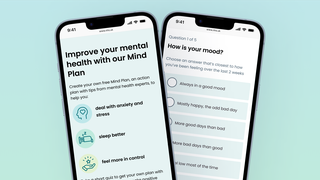Sleep problems
Sleep problems are common, and the reasons we struggle to sleep are likely to change throughout our lives, for instance, illness, work or having a baby are possible causes.
A few sleepless nights are usually nothing to worry about, but it can become an issue if a lack of sleep starts to affect your daily life.
Learn more about signs you might be sleep deprived, common symptoms of insomnia and if poor sleep hygiene or sleep habits could be the reason.
Understanding sleep problems including insomnia
It's important to appreciate why we sleep: to rest and repair our mind and body. It's vital for good physical and mental health and wellbeing.
Longer stretches of bad sleep can do the opposite and have a negative impact on our physical and mental health or wellbeing.
Not getting enough sleep is sometimes described as being sleep deprived, or called "sleep deprivation", "sleeplessness" or "sleep inefficiency".
What is the meaning of insomnia?
If someone cannot get to sleep or stay asleep for long enough to feel refreshed, they might have insomnia. Insomnia is a sleep disorder that can last for months or years.
Changing your sleeping habits often helps with sleep problems including insomnia. If this does not help or you think you have a sleep problem, see a GP.

Get sleep tips sent to your inbox
Your sleep matters, so put sleep first by joining our 6-week email programme. From creating your perfect sleep sanctuary to setting a wind-down alarm, join today to find out how to make "goodnight" a great night.
How many hours of sleep do I need?
A healthy adult usually needs around 7 to 9 hours of sleep. However, age, health and personal circumstances affect how much sleep we need, plus some people naturally sleep more than others.
Teenagers, children and babies need more sleep because they are still growing, but that varies, too, with a newborn sleeping anywhere between 8 to 16 hours.
Signs or symptoms of sleep problems
You may:
- find it difficult to fall asleep
- lie awake for long periods at night
- wake up several times during the night
- wake up early and be unable to get back to sleep
- feel down or have a lower mood
- have difficulty concentrating
- be more irritable than usual
Longer-term sleep problems can affect our relationships and social life, and leave us feeling tired all the time, eating more and not able to do daily tasks.

Possible causes of sleep problems
There are many reasons why we might not sleep well.
Some people are naturally lighter sleepers or take longer to get to sleep while others might sleep badly because of anxiety, worry over stressful events or other life challenges.
There are lots of things that can influence how well we sleep, such as our current physical or mental health, our upbringing, things that happen to us, and even our temperament.
However, bad sleep habits or poor sleep hygiene, such as not relaxing or winding down before bed, often cause sleep problems.
Video: Expert advice for dealing with sleep problems
Professor Colin Espie, professor of sleep medicine at the University of Oxford, says: "It really helps if you're on a wind-down curve some while before you go to bed."
Does sleep hygiene help with sleep problems?
Good sleep habits, such as going to bed and getting up at the same time every day, can really help us to get better sleep.
Having a regular sleep routine is sometimes called sleep hygiene.
Find what works for you

Create your own free Mind Plan
Answer 5 quick questions to get your plan with practical tips to help you deal with stress and anxiety, improve your sleep and feel more in control.
More support for sleep problems
-
Seek NHS support
If poor sleep is affecting your daily life or causing you distress, call NHS 111 or talk to your GP.
-
Charities, helplines and communities
The following organisations offer advice on their websites:
-
Books on mental health and wellbeing
Check out Reading Well’s list of books on mental health that should be available free from your local library. The list has topics including mindfulness and other subjects.
Helping someone else
Get tips and advice on helping others struggling with their mental health.
Urgent support
If you cannot wait to see a doctor and feel unable to cope or keep yourself safe, it's important to get support.
Help us improve this page!
Was this content helpful? Answer a few quick questions to help us make it better.